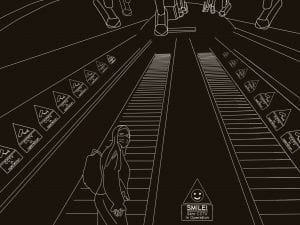
Third Year BA Fashion and Dress History student Rachel Ng shares latest discussions on the face mask and surveillance
A few weeks ago, I read Rachel Kraus’s article titled ‘The Future of Anti-Surveillance Fashion is Bright’ about the potential of a facial covering to cover identity. Over the past year, face masks have become commonplace and necessary for public health and safety. Kraus states, ‘In the future, they could be the ultimate anti-surveillance fashion statement’.
I recently visited London to see family and we were taking photos in the underground. When I returned home, I was editing the photos with Procreate, one of my hobbies. However, I noticed the sheer numbers of CCTV cameras there were dotted around the station. Of course, they are there for safety, but it left me wondering how difficult it must currently be for people to identify someone. In response, I sketched an image of what it feels like to be on camera all the time. (Fig. 1)
This post comes at an appropriate time that coincides with the recent protests and the use of a mask to conceal one’s identity. The mask seems to have become a political statement that cannot only hide your identity but also highlights political uncertainty. @KateRoseBee (Twitter) shared a short video of herself in a new mask that had printed on it ‘I do not consent to search’. (Fig. 2) The mask prevents the possibility of facial recognition whilst protesting.
There has been rising concern, in parallel with the rise of Artificial Intelligence technologies, regarding increased surveillance in our digital as well as physical lives. Although these technologies are said to tailor content, protect, and look out for us, what is to stop them from being exploited? Growing distrust in the police and government, especially amongst young people, could lead to these technologies being used to track down peaceful protestors.
Is there longevity in mask wearing? Will it continue in a post-pandemic society? Is this the future of identity protection?
Kraus’s article discusses PhD student Chiang Xie’s research into anti-surveillance fashions. Xie’s recent publication explored the idea of creating a Universal Physical Camouflage. Put simply, it is a patterning which can trick recognition systems into thinking you are something other than a human – for example, a potted plant. (Fig. 3) Science professor Tom Goldstein states, ‘now that you have the ability to wear a mask, you can cover more of your body. The more of your body you can cover with adversarial patterns, the more susceptible these attacks are’. This suggests that there is a potential for an individual to be completely anonymous whilst walking the streets.
For me personally, I enjoy having the option to cover my face in an outdoor area. It prevents the spread of the Coronavirus but also provides me with comfort that if someone takes a photo of me, (accidently or not) I know that most of my identity is protected.
What are your thoughts on anonymity and surveillance?
Is surveillance necessary for the public’s safety?
Are you concerned about your own privacy?
You can read Kraus’ article here: https://mashable.com/article/anti-surveillance-masks/?europe=true&fbclid=IwAR0t-bTVU3Sb_RL4VGLH7PAUQGOLbDkvcmbBuzfmgATZdHFDLm5h7eCULIY
Chiang Xie’s recent publication on Universal Physical Camouflage: https://cs.jhu.edu/~alanlab/Pubs20/huang2020universal.pdf


